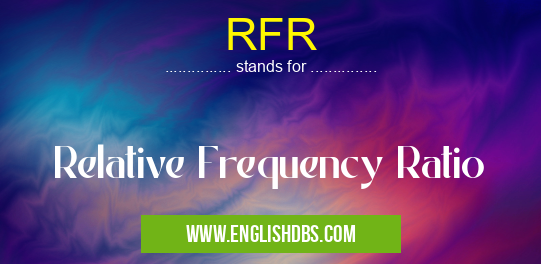What does RFR mean in UNCLASSIFIED
Relative Frequency Ratio (RFR) is a statistical measure that compares the frequency of an event within a particular group to the frequency of the same event in a reference group. It is commonly used in epidemiology, social sciences, and other fields to assess the association between exposure and outcome.

RFR meaning in Unclassified in Miscellaneous
RFR mostly used in an acronym Unclassified in Category Miscellaneous that means Relative Frequency Ratio
Shorthand: RFR,
Full Form: Relative Frequency Ratio
For more information of "Relative Frequency Ratio", see the section below.
RFR Formula
The formula for calculating RFR is as follows:
RFR = (Frequency of event in exposed group) / (Frequency of event in unexposed group)Interpretation
An RFR value of 1 indicates that the frequency of the event is the same in both the exposed and unexposed groups, suggesting no association between exposure and outcome.
An RFR value > 1 indicates that the event is more frequent in the exposed group compared to the reference group, suggesting a possible association between exposure and outcome.
An RFR value < 1 indicates that the event is less frequent in the exposed group compared to the reference group, suggesting a possible protective effect of exposure.
RFR vs. Risk Ratio
RFR is similar to the risk ratio (RR), but it is calculated using frequencies instead of proportions. RFR is used when the outcome is rare, while RR is used when the outcome is common.
RFR vs. Odds Ratio
RFR is also similar to the odds ratio (OR), but it does not take into account the number of individuals in the study. RFR is easier to interpret than OR when the outcome is rare.
Essential Questions and Answers on Relative Frequency Ratio in "MISCELLANEOUS»UNFILED"
What is Relative Frequency Ratio (RFR)?
Relative Frequency Ratio (RFR) is a statistical measure that compares the frequency of an event occurring in two different groups. It quantifies the likelihood of an event happening in one group relative to another.
How is RFR calculated?
RFR is calculated by dividing the frequency of the event in the first group by the frequency of the event in the second group. The result is a ratio that indicates the relative likelihood of the event occurring in each group.
What does an RFR value greater than 1 indicate?
An RFR value greater than 1 indicates that the event is more likely to occur in the first group relative to the second group. In other words, the event is more prevalent or frequent in the first group.
What does an RFR value less than 1 indicate?
An RFR value less than 1 indicates that the event is less likely to occur in the first group relative to the second group. This means the event is less prevalent or frequent in the first group.
What are the applications of RFR?
RFR is widely used in various fields, including epidemiology, clinical research, and market research. It helps researchers compare the risk factors, outcomes, or exposures between different groups.
Are there any limitations to using RFR?
Like any statistical measure, RFR has certain limitations. It assumes independence between the groups being compared, and it does not account for potential confounding factors that may influence the results.
Final Words: Relative Frequency Ratio is a useful statistical measure that can help researchers assess the association between exposure and outcome. By comparing the frequency of an event in an exposed group to a reference group, RFR provides valuable insights into the potential impact of exposure on the occurrence of a particular event.
